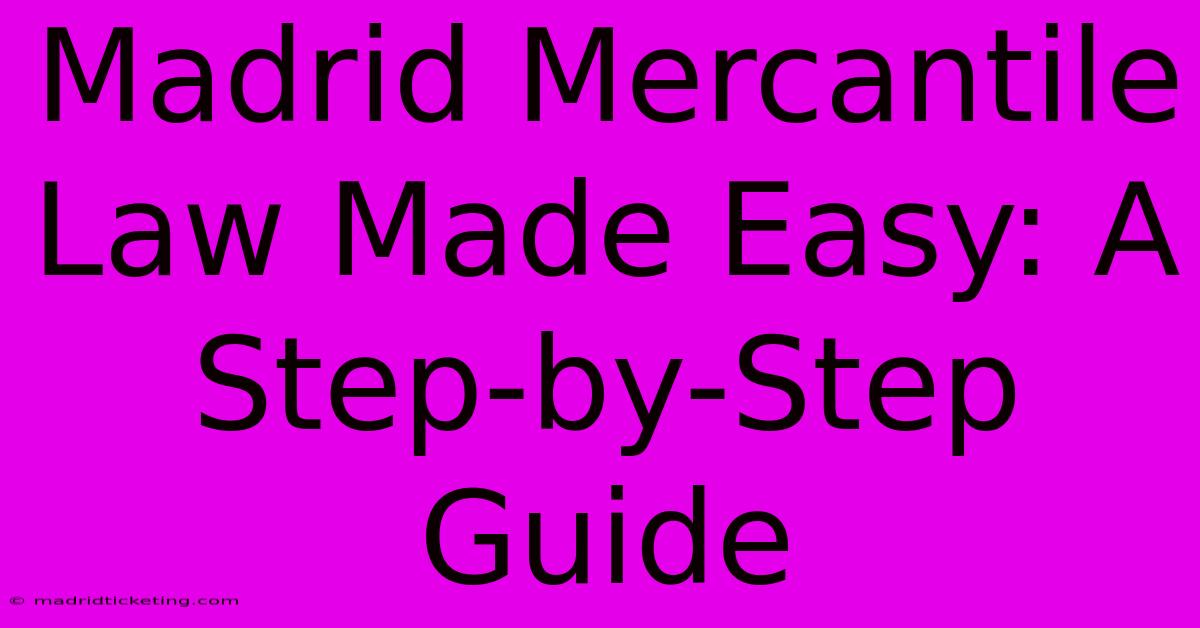Madrid Mercantile Law Made Easy: A Step-by-Step Guide

Table of Contents
Madrid Mercantile Law Made Easy: A Step-by-Step Guide
Navigating the intricacies of Spanish mercantile law, particularly in a bustling city like Madrid, can feel daunting. This comprehensive guide aims to simplify the process, providing a step-by-step approach for understanding and complying with key aspects of Madrid's mercantile legal framework. Whether you're a seasoned entrepreneur or just starting your business journey in Madrid, this guide will equip you with the essential knowledge to succeed.
Understanding the Basics of Spanish Mercantile Law
Spanish mercantile law, or Derecho Mercantil, governs commercial activities and transactions. It differs from civil law in its focus on business relationships, contracts, and specific commercial practices. Key areas include:
- Business Formation: Choosing the right legal structure (Sociedad Limitada, Sociedad Anónima, etc.) is crucial. Each structure has different legal and tax implications.
- Contracts: Understanding and drafting legally sound commercial contracts is paramount to protecting your business interests. This includes sales contracts, distribution agreements, and franchise agreements.
- Intellectual Property: Protecting your trademarks, patents, and copyrights is essential for maintaining a competitive edge in the Madrid market.
- Competition Law: Compliance with Spanish and EU competition laws is vital to avoid hefty fines and legal repercussions.
- Insolvency and Bankruptcy: Knowing your rights and obligations in case of financial difficulties is crucial for mitigating potential losses.
Step-by-Step Guide to Mercantile Law Compliance in Madrid
Step 1: Choosing the Right Business Structure:
This is the foundational step. Carefully consider the size and scope of your business, your liability preferences, and tax implications before selecting a legal structure. Consulting with a abogado (lawyer) specializing in Spanish mercantile law is highly recommended. Popular options include:
- Sociedad Limitada (SL): A limited liability company, offering liability protection to its owners.
- Sociedad Anónima (SA): A public limited company, often used by larger corporations.
Step 2: Registering Your Business:
Registering your business with the appropriate authorities is mandatory. This involves:
- Obtaining a Tax Identification Number (NIF): This is essential for all business operations in Spain.
- Registering with the Mercantile Registry (Registro Mercantil): This officially establishes your business's legal existence.
Step 3: Drafting and Executing Contracts:
Ensure all your commercial contracts are clear, concise, and legally sound. Ambiguity can lead to disputes, so professional legal assistance is highly recommended.
Step 4: Protecting Intellectual Property:
Registering your trademarks and patents with the Spanish Patent and Trademark Office (Oficina Española de Patentes y Marcas) provides legal protection against infringement.
Step 5: Ensuring Competition Law Compliance:
Familiarize yourself with Spanish and EU competition laws to avoid anti-competitive practices such as price-fixing and market manipulation.
Step 6: Understanding Insolvency Procedures:
Be aware of the insolvency procedures in Spain and consult with legal professionals to develop a contingency plan in case of financial difficulties.
Resources for Navigating Madrid's Mercantile Law
While this guide provides a basic overview, it's crucial to seek professional advice. Several resources can help you navigate the complexities of Madrid's mercantile law:
- Spanish Ministry of Justice: Offers information on legal frameworks and regulations.
- Colegio de Abogados de Madrid: The Madrid Bar Association, provides access to legal professionals.
- Legal Professionals: Consulting with a lawyer specializing in Spanish mercantile law is strongly advised.
Conclusion: Success in Madrid Requires Legal Understanding
Successfully operating a business in Madrid requires a solid understanding of Spanish mercantile law. By following these steps and seeking professional guidance, you can build a strong legal foundation for your business and confidently navigate the complexities of the Madrid market. Remember, proactive compliance is key to minimizing risks and maximizing your chances of success. Don't hesitate to seek professional legal advice throughout the entire process. This investment will undoubtedly pay off in the long run.

Thank you for visiting our website wich cover about Madrid Mercantile Law Made Easy: A Step-by-Step Guide. We hope the information provided has been useful to you. Feel free to contact us if you have any questions or need further assistance. See you next time and dont miss to bookmark.
Featured Posts
-
Last Minute Cheap Tickets Real Madrid Vs Barcelona
Apr 05, 2025
-
Madrid Apartments Your New Home Awaits E400 E550
Apr 05, 2025
-
Madrids Number 5 A Decade By Decade Look
Apr 05, 2025
-
Modernize Your Madrid Home With Drywall
Apr 05, 2025
-
Real Madrids Brazilian Legends Their Appearances Unveiled
Apr 05, 2025
